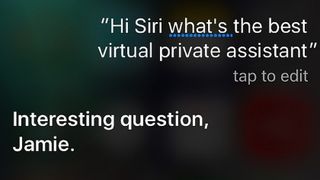Are we entering the post-app era?
The concept of an app is changing fast
App aggregation
The services that apps offer are already being consumed en masse by virtual private assistants. "Siri is already an example of aggregation as it enables the user to perform multiple tasks such as checking the weather, searching online, sending an email, scheduling a meeting, and many other things," says Magnus Jern, President of mobile enterprise tech firm DMI International, who thinks we're on the cusp of sophisticated aggregation services.
"Facebook will do it with Messenger and new third-party services' APIs for chatbots etc, and WeChat and Line already do this," he says of instant messaging apps that are fast becoming 'smart agent' platforms themselves. But will aggregation services actually replace apps? "Not in the short-term, because depending on the use case, apps will still provide a better experience for a lot of our daily tasks," says Jern. "Instead the aggregation services will integrate with the standalone apps."
However, that does suggest that the most popular, wealthy and ambitious apps – such as Facebook and WeChat – are at least as well positioned as OS developers Apple and Google to create the dominant new virtual assistant platforms.
The spoken word
How we interact with the services currently offered by apps will change, too. The smart money is on voice. "Interaction models are changing," says Frank Palermo, Executive VP for Global Digital Solutions at IT services company VirtusaPolaris, who thinks that with advances in AI-powered virtual assistants, voice will soon be at the centre of the user experience. A supercharged, more conversational Siri (and other assistants) will effectively make individual apps redundant.
"You no longer need to click on your phone and open an app," adds Palermo, "it is a much more immersive experience where you are interacting with your device in a more conversational way – it literally becomes your pocket PA."
Is natural language good enough?
Not quite yet. Siri is getting cleverer, certainly, but doesn't understand everything it's told. Ditto Nuance's Dragon Dictation; every year it gets less muddled and more accurate. "We are very close to having natural language being the primary means of interacting with the software," thinks Jepsen, who predicts a 'conversational experience'.
"Rather than navigate screens, tools and clunky interfaces, employees will be able to type or say 'show me my payslip' or 'complete my expenses'," says Jepsen, whose Unit4 company has created a digital assistant for workplaces called Wanda that inserts itself into existing apps. "We don't need to build our own screens or apps to accommodate this, we can use somebody else's, like Skype for Business, Twitter, or Facebook," he adds. "Everything will become easier, it will become natural."
Are you a pro? Subscribe to our newsletter
Sign up to the TechRadar Pro newsletter to get all the top news, opinion, features and guidance your business needs to succeed!

The post-app future
Apps are on the watch-list, and are already being phased out. That's no surprise to some, who think they're inherently unnatural. "Clicking through buttons is not natural human behaviour," says Palermo, who believes we're moving towards a more immersive and ambient world, where it's possible for people to have a natural discussion with their surroundings.
"We won't need to type, we will just speak and our device will present the information we need in a visual way – perhaps by combining with virtual reality to help us visualise our answers," adds Palermo. Either way, the era where smartphone users launched apps individually is soon going to seem archaic.
- 1
- 2
Current page: App aggregation and the post-app future
Prev Page Introduction and blame the browserJamie is a freelance tech, travel and space journalist based in the UK. He’s been writing regularly for Techradar since it was launched in 2008 and also writes regularly for Forbes, The Telegraph, the South China Morning Post, Sky & Telescope and the Sky At Night magazine as well as other Future titles T3, Digital Camera World, All About Space and Space.com. He also edits two of his own websites, TravGear.com and WhenIsTheNextEclipse.com that reflect his obsession with travel gear and solar eclipse travel. He is the author of A Stargazing Program For Beginners (Springer, 2015),
Most Popular




